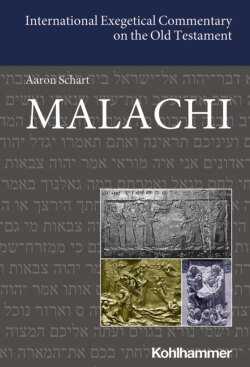Читать книгу Malachi - Aaron Schart - Страница 10
На сайте Литреса книга снята с продажи.
The Greek Translation
ОглавлениеFrom a Christian point of view the translation of the Malachi document into Greek is very significant since the New Testament authors used Malachi in Greek translation. In fact, the first Christian Bible contained the whole Old Testament in a Greek version. Regrettably, the fragmentary Dodekapropheton scroll from Naḥal Ḥever (8ḤevXII) contains no text from the Malachi document; as a result we have only the so-called Septuagint version at our disposal. It was very probably created by a single translator in the context of a translation of the whole Book of the Twelve.5
To maintain consistent clarity in distinguishing the Greek translation from the Hebrew version I use the phrase “Book of the Twelve” solely for the Hebrew version, referring to the Greek translation as the “Dodekapropheton” and its translator as the“Dodekapropheton translator”.6
Septuagintal Translation Style The Greek translation is very literal: with few exceptions every morpheme in the Hebrew Vorlage is represented by its precise Greek equivalent. Even the sequence of words and syntax are strictly retained, to the point of occasional imitations of the Hebrew nominal clause.7
One measure of the great fidelity of the LXX to its Hebrew original is provided by passages that are incomprehensible in Hebrew: in such cases the Dodekapropheton translator renders the text mechanically, word for word, and leaves it to the reader to make sense of it. At MT-Mal 2:3b, for example, the phrase “and he shall lift you up to him” makes no sense in Hebrew. The Septuagint accommodates the predicate to the preceding subject, “Yhwh,” but otherwise translates word for word without producing any sense: “and I will bring you to the same.” It is notoriously difficult to decide whether a deviation from the MT represents a different Hebrew Vorlage, a different understanding of the Hebrew (especially of the meaning of rare lexemes), an inadvertent mistake, or a deliberate alteration.
There are probably only three passages in which the Dodekapropheton translator had a consonantal text in his Vorlage that differed from that of Codex Leningradensis: The Vorlage for LXX-Mal 1:13 had צבאות [= “of hosts”]. In Mal 3:15 zedîm was incorrectly written as zarîm. In Mal 2:16 the verse began with כי אם שׂנאת, kî ’im śāne’tā, attested also in 4QXIIa.
Passages in which the Dodekapropheton translator inserted additional words not attested in the Hebrew Vorlage occur six times (Mal 1:1; 1:7; 2:2; 3:3; 3:6a; 3:19 [4:1 ET]). In most cases the translator took the additional words from the immediate context in order to smooth the text.
“Malachi” as Title: “Messenger of the Lord” It is important that the Dodekapropheton translator understood the Hebrew expression מלאכי in Mal 1:1 not as a proper name but as a title, “messenger of the Lord”. He identified this “messenger of the Lord” with Haggai, as we can infer from the borrowing of the injunction “do place it upon your hearts” from LXX-Hag 2:15.
Anthropomorphism The Dodekapropheton translator avoided (evidently on purpose) some anthropomorphic divine statements (e.g., in Mal 1:7b; 1:13a; 2:3a), including the idea that a human can “tempt” or “test” (בחן) God (Mal 3:10, 15).
Writing the nomina sacra It should be pointed out, from a Christian perspective, that the Dodekapropheton was adopted into the Christian canon of the Bible as part of the Greek version of Israel’s scriptures, which Christians refer to as the “Old Testament.” In the course of that editing project it appears that a single change was made to the documents of the Dodekapropheton, namely, a new way of writing the nomina sacra; that is, particular words that are connected directly with God (such as Kyrios, God, Christ, and Jesus) were written using only the first and last letters of the word, with a single horizontal line extended above them. This was meant to express the belief that both the Old Testament and the New Testament speak of the same God, self-revealed in Jesus Christ. The Dodekapropheton version of the Malachi document is preserved only in its Christian form. The perhaps oldest surviving, but unfortunately only fragmentary manuscript of the Christian version is represented by Codex Washingtonensis (third c. CE).8 The oldest complete versions are in Codex Vaticanus (fourth c. CE) and Codex Sinaiticus (fourth c. CE).9
